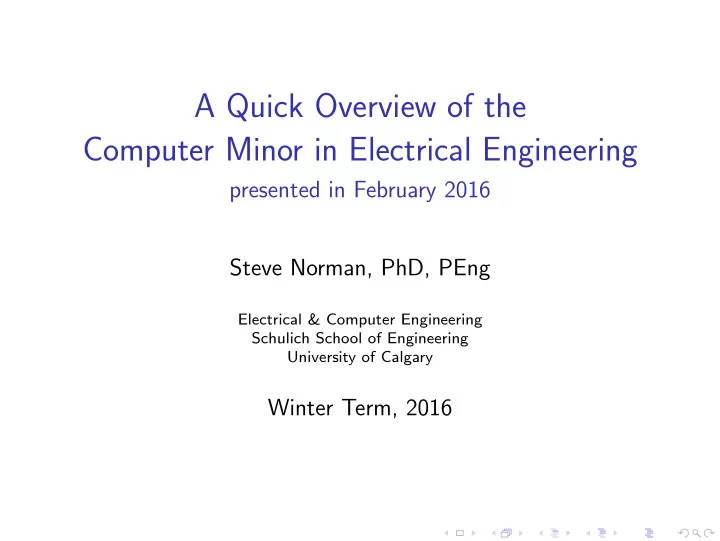

A Quick Overview of the Computer Minor in Electrical Engineering presented in February 2016 Steve Norman, PhD, PEng Electrical & Computer Engineering Schulich School of Engineering University of Calgary Winter Term, 2016
slide 2/12 Computer Minor Overview 2016 If you’re in Software Engineering . . . You don’t have a choice to make. But you might be interested in learning what courses some of your future co-workers might be taking.
slide 3/12 Computer Minor Overview 2016 If you’re in Electrical Engineering . . . Make your choice based on what you believe to be your talents and interests! Your profs . . . ◮ can’t accurately predict the job market for interns in 2017; ◮ can’t accurately predict the job markets for new graduates in 2018 and 2019; ◮ totally can’t predict the evolution of job markets over the course of all of your careers!
slide 4/12 Computer Minor Overview 2016 Disclaimers These slides should give you a clear explanation of the essential differences between the “regular” Electrical Engineering degree and the Electrical Engineering degree with a Computer Engineering minor. However, do NOT use these slides as a definitive guide to degree requirements, for two main reasons . . . ◮ The official University of Calgary Calendar for 2016–17 has not yet been published. ◮ The author of these slides may have made some minor errors. Complementary Studies requirements are the same for both programs, so I’ve left them out to keep things as simple as possible.
slide 5/12 Computer Minor Overview 2016 Third year, courses taken by all ENEL students ◮ ENCM 467: Digital Electronic Circuits ◮ ENEL 102: Computing Tools 2 ◮ ENEL 400: Electrical Engineering Design and Communications ◮ ENEL 419: Probability and Random Variables ◮ ENEL 441: Control Systems I ◮ ENEL 453: Digital Systems Design ◮ ENEL 471: Introduction to Communications Systems and Networks [Note: The version of the slides I presented in lecture left out ENEL 400. I fixed that before posting these slides.]
slide 6/12 Computer Minor Overview 2016 The rest of third year in the regular Electrical program ◮ ENEL 469: Analog Electronic Circuits ◮ ENEL 475: Electromagnetic Fields and Applications ◮ ENEL 476: Electromagnetic Waves and Applications ◮ ENEL 487: Electrical Engineering Energy Systems
slide 7/12 Computer Minor Overview 2016 The rest of third year in the Computer Minor All of these three courses: ◮ CPSC 319: Data Structures, Algorithms, and Their Applications ◮ ENSF 409: Principles of Software Development ◮ ENCM 511: Embedded System Interfacing Plus one of these three courses: ◮ ENEL 469: Analog Electronic Circuits ◮ ENEL 475: Electromagnetic Fields and Applications ◮ ENEL 487: Electrical Engineering Energy Systems
slide 8/12 Computer Minor Overview 2016 About fourth year technical electives All Electrical students will get some degree of choice, but . . . . . . you can’t have perfect freedom of choice, because many of the technical electives have prerequisites in the third year curricula.
slide 9/12 Computer Minor Overview 2016 Fourth year, courses taken by all ENEL students ◮ ENEL 500: Two-term design project course ◮ technical elective 1 ◮ technical elective 2
slide 10/12 Computer Minor Overview 2016 The rest of fourth year in the regular Electrical program ◮ technical elective 3 ◮ technical elective 4 ◮ technical elective 5 ◮ technical elective 6
slide 11/12 Computer Minor Overview 2016 The rest of fourth year in the Computer Minor ◮ technical elective 3 ◮ CPSC 457: Operating Systems ◮ ENCM 501: Principles of Computer Architecture ◮ ENEL 573: Telecommunications and Computer Communications
slide 12/12 Computer Minor Overview 2016 How and when to apply? If you’re sure do not want the Computer Minor, don’t do anything! If you’re pretty sure you do want the Computer Minor, apply on the Web by February 29, 2016! Follow the instructions emailed to you by the Engineering Student Centre (ESC). If you haven’t got the email, or if you have but you’ve deleted it, go to the ESC (Science B 149) as soon as possible. If you change your mind after February 29, we can’t guarantee that we can fix things for you! But if you do, please contact Norm Bartley (Director of undergraduate Electrical Engineering) as soon as possible—the sooner you do that, the better the odds will be that you’ll get the third-year program you want.
Recommend
More recommend